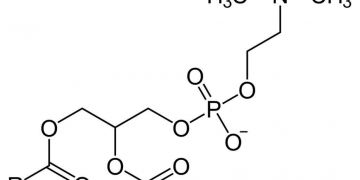Cardiovascular benefits
As a tool for heart health, lecithin also works to reverse and prevent damages that may arise from coronary artery disease. Preventing cholesterol and other fats from sticking is a vital function for the overall health of anyone with a predisposition to heart disease and other cardiovascular afflictions. The lubrication provided by lecithin creates a slippery lining on which it is difficult for large, fatty deposits to adhere. When large deposits of fat cannot adhere to specific regions of the body, they are transported to the liver where they are metabolized and converted to energy. Improved circulation seen as a result of lecithin supplementation helps to prevent blood clots and maintain the health of the liver through which excess fats and energy-providing substances will pass. Lecithin is also believed to have positive effects in the repair of livers damaged by any number of conditions, including excess consumption of alcohol or other toxins.
Soy lecithin is also known for lowering levels of bad cholesterol and triglycerides. Additionally, soy lecithin is said to increase HDL, otherwise known as good cholesterol, and to provide added benefits to patients already on a medication for treating high cholesterol. There are a number of additional uses for lecithin, though most benefits fall in line with the nervous and circulatory systems.
Protects cells
Lecithin is a necessary component of every cell in the human body. Considered a keystone in the construction of cells, lecithin prevents the hardening of cell membranes. Healthy cells lead to a healthier body, and the membranes are a critical part in monitoring a cell's intake and output. Protecting cells is integral in maintaining a body's resistance to many diseases that attack damaged cells. Phospholipids such as lecithin are produced in certain amounts throughout the major organs of the body (such as the heart, liver and kidney) but can be supplemented to further enhance unrealized benefits.
Helps repair liver and protects arteries
In addition to the cardiovascular benefits of lecithin, there are indications that lecithin helps to restore livers that have been damaged as well as working with neurological functions such as memory to improve the brain's effectiveness. Since lecithin is essentially composed of fat, it can act as a protective wall or sheath throughout the body to protect and strengthen membranes and prevent detrimental debris from sticking. Internal parts and mechanisms that may be affected negatively by hardening, such as arteries, are kept malleable by lecithin in a natural way through supplementation. Patients suffering from atherosclerosis often start a regimen of lecithin in an effort to reverse the condition's effects.
Aids memory
Lecithin has shown, in addition to the heart, circulatory and metabolic benefits, a tendency to aid the brain in memory and learning. Studies conducted on the effects of lecithin on the brain lean towards a conclusion that users of the supplement are likely to experience increased memory and ability to recall specific information. The benefits of lecithin on the brain are promising to patients who may be suffering from Alzheimer's disease or other memory-specific neurological conditions. Improved memory and recall is a sign of a brain's overall standard of health, and may imply benefits that extend to orientation and cognitive thought processes.
Summary
Lecithin can be used as a tool to help the body recover from previously identified conditions or shortcomings, as well as for preventive purposes. Individuals with a history of any neurological or cardiovascular condition may take lecithin as a supplement to lessen their chances of a recurring issue. Additionally, those with a genetic background indicating certain conditions may occur could take lecithin for preventive reasons. The supplement lecithin should be taken regularly for the most consistent results.





